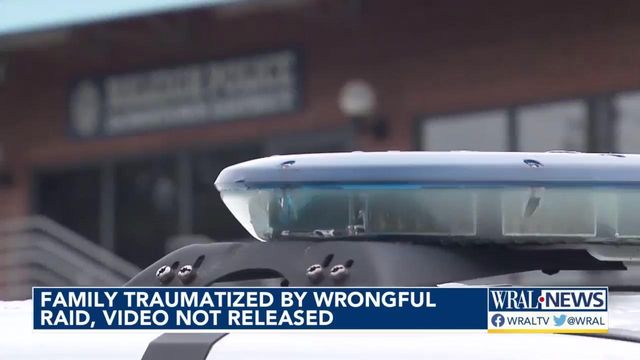Lawsuit accuses Raleigh police of illegally raiding two families' homes using no-knock warrant
A lawsuit filed by local civil rights advocates on behalf of two Raleigh families accuses the Raleigh Police Department of illegally raiding two homes in May 2020.
The lawsuit was filed on Monday against a group of officers within the department's Selective Enforcement Unit, officers appointed by the chief of police that are knowledgeable in hostage negotiation, drug trafficking and chemical agents. The officers, heavily armed, forced themselves into the homes of two families using a no-knock warrant, the lawsuit filed by Tin Fulton, Walker & Owen, Emancipate NC and Littlejohn Law alleges.
Advocates claim that Raleigh officers pointed assault rifles at women and children, "frisked and searched them, and forced them to sit on the ground for over an hour while their homes were ransacked." This search was unconstitutional, the lawsuit says, and plaintiffs in this case are demanding compensatory and punitive damages.
None of the 10 people searched by Raleigh police on Burgundy Street were ever found guilty of a crime, according to the lawsuit. One man who was searched was Juwan Harrington, a 22-year-old who is paralyzed on his left side and wheelchair bound. At least four of the plaintiffs were under the age of 18 at the time of the raid.
The Raleigh Police Department has refused to offer summary information about the incident, but a spokesperson said it has been the departments practice not to utilize no-knock warrants even prior to May 2020.
Raleigh officers acted on bad intelligence from informant, lawsuit claims
The lawsuit says that one of the officers in the group was given incorrect information from an informant, which led police to raid the homes of the two Raleigh families. The informant police were relying on was recruited in 2018 and has been charged with several crimes, including violent felonies, the legal group asserts. Dennis Leon Williams Jr., 27, was homeless at the time of his arrest and became an informant to make money. Williams was paid a total of $3,454 during his time as an informant, according to the suit.
The lawsuit claims that the officers involved in the search knew that the information given to them was false but continued with the raid anyway.
15 men were previously arrested on false evidence from the same informant
The officer who hired Williams, Omar Abdullah, was fired in November 2021, for making 15 bogus drug trafficking arrests based on bad information from Williams. Charges in all of those case have since been dropped, and Williams was charged in August 2021 with five counts of obstruction of justice. Some of the men spent as long as five months in jail before their charges were dropped, according to a separate lawsuit filed against Abdullah. Raleigh officials agreed to pay 13 of the men a total of $2 million to settle a lawsuit over their wrongful arrests.
Lawsuit accuses officers of knowing that the evidence from the informant was fabricated but continued with the raid anyway
The lawsuit filed on Monday claims that Williams fabricated evidence that suggested one of the plaintiffs was trafficking heroin. Williams shielded surveillance cameras he was wearing, the lawsuit claims, so that the supposed drug purchases were never caught on camera. Despite the lack of evidence, Williams was still paid by Abdullah, the lawsuit alleges.
Abdullah continued to use Williams as an informant, even after the Raleigh Police Department determined he could not prove that any of the plaintiffs were dealing drugs.
Four other officers on Abdullah's team went along with the scheme and "failed to intervene to stop the continued use of Williams as a confidential informant or the continued wrongful searches, seizures, and prosecutions based on fabricated evidence," the lawsuit alleges.
The search warrant given to a sergeant to sign off claimed that Yolanda Irving was seen purchasing heroine, which was untrue, advocates claim.
The lawsuit described that Irving's children feared for their lives and thought they were going to be shot and killed by 15 heavily armed officers carrying shields and assault rifles. Irving said in the lawsuit that she was "terrified" that officers were going to shoot her wheelchair bound son because he was "not able to comply with the officers' orders to get on the floor."
After not finding drugs in Irving's home, the group of officers broke down the door of her neighbor's home, Kenya Walton. There was no search warrant for Walton's home, the lawsuit claims. Walton's 18-year-old son also said he was handcuffed during the raid, despite not having done anything criminal, according to the lawsuit.
"Plaintiffs have suffered, and continue to suffer, severe and ongoing damages, specifically physical pain and injuries, serious psychological and emotional damage, and loss of quality of life," the lawsuit reads.
A day after the raid, the police department suspended Williams as a confidential informant, the legal group claims.
The advocacy groups are asking the court for a trial by jury.
Wake County judge denies public release of body camera footage
Earlier this month, Abraham Rubert-Schewel, a civil rights attorney working out of the Durham office of Tin, Fulton, Walker and Owen, petitioned the Wake County Superior Court's office to release body camera footage of the raid.
Judge Bryan Collins with the Wake County Superior Court released parts of the body camera footage to Rubert-Schewel and his legal team but did not make them public.
"I've made my ruling, and I found there was good cause to release it to you, but not good cause to release it to the public," Collins told Rubert-Schewel, without further explanation.
The families said they were "very upset" over the judge's ruling.
"We were violated ... [there] was no drugs, no money, nothing in there," Irving said.
Sherita Walker, an attorney representing the Raleigh Police Department, objected to the release — stating it wasn't a critical incident that resulted in injury or loss of life.
"Here, we have a case where officers were acting on information that they had at the time based on information that was contained in the search warrant," said Walker
Chief Estella Patterson claims RPD does not use no-knock warrants
When questioned by WRAL News on Tuesday, Raleigh Police Chief Estella Patterson said that her department does not "seek or utilize no-knock warrants."
“It is very clear that we won’t serve no-knock warrants. Officers must knock and announce when executing a warrant," she told WRAL News. "I personally believe that it is the best route to take. It’s the safest for favorable outcomes for our employees as well as those where we are serving warrants."
Patterson said the law does not specify how much time officers have to give someone to answer the door.
"It just states you knock and announce your presence," she said. "I have always been taught that you clearly knock on the door and then you clearly announce and then you enter at that time."
Patterson did not provide any information to WRAL News about the incident mentioned in the lawsuit.












